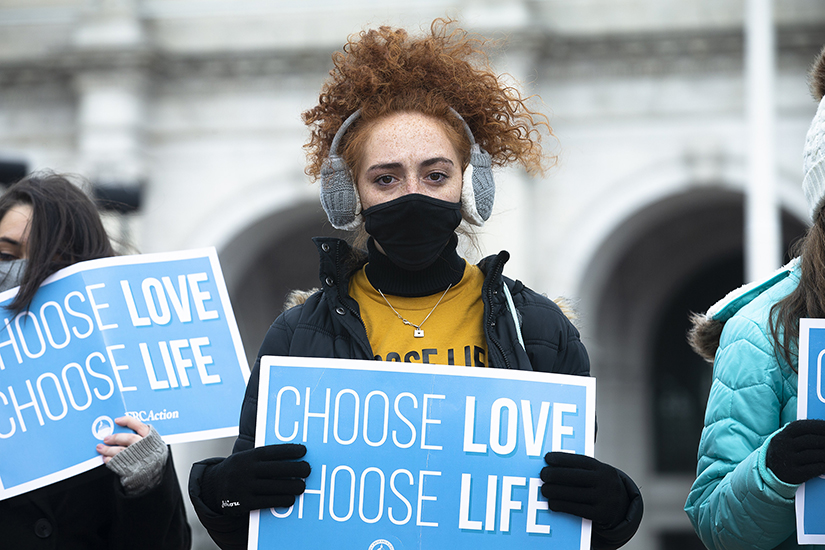WASHINGTON -- It was the coldest national March for Life in some years, it was the smallest, and it also may be remembered as the bravest.
A little over 200 people, tightly flanked by members of the Knights of Columbus, endured subfreezing temperatures and wind as they sang hymns and trudged a zigzag route with Jeanne Mancini, president of the March for Life Education and Defense Fund, from the Museum of the Bible to the Supreme Court Jan. 29.
Mancini acknowledged "that we're all symbolically marching, and we're all in solidarity with each other."
Before they stepped off, she told the marchers, originally a group of 60, that although this year was a deeply somber occasion, "let's be prayerful" and to fulfill the event "in the best way we can."
Marchers included Auxiliary Bishop Joseph L. Coffey of the Archdiocese for the Military Services. "Never despair, never give up and keep fighting," Bishop Coffey told EWTN while marching.
Others included former NFL player Benjamin Watson and Abby Johnson, the former Planned Parenthood clinic director who operates the pro-life ministry And Then There Were None.
The march, lasting about 90 minutes, was considerably quieter than the placard- and flag-filled processions of thousands up Constitution Avenue in previous years. And there were no counterprotesters.
Tim Saccoccia, a March for Life board member and a senior policy director for the Knights of Columbus, said the original group was joined halfway through the route by more than 100 others who seemed to be mostly from the Washington area.
There was a brief moment of concern, but the additional marchers turned out to be well-behaved. "They were very respectful," Saccoccia told Catholic News Service in a phone interview from the march.
"We had a fantastic partnership with the D.C. police," he added. "The Capitol Police also came out to help us."
 March for Life participants demonstrated near Union Station in Washington Jan. 29.Photo Credit: Tyler Orsburn | Catholic News ServiceIt was tough, even with a diminished event, "to stay socially distanced at times," Saccoccia acknowledged. "Not everyone is a professional marcher."
March for Life participants demonstrated near Union Station in Washington Jan. 29.Photo Credit: Tyler Orsburn | Catholic News ServiceIt was tough, even with a diminished event, "to stay socially distanced at times," Saccoccia acknowledged. "Not everyone is a professional marcher."
The rally began and ended with song and prayer with songs performed by Matthew West, a Christian recording artist and songwriter. The opening prayer was said by Archbishop Joseph F. Naumann of Kansas City, Kansas, chairman of the U.S. bishops' Committee on Pro-Life Activities, and the closing prayer was said by Cissie Graham Lynch, granddaughter of the well-known Southern Baptist minister, Rev. Billy Graham.
The archbishop prayed for God's blessing on the "pro-life movement in this nation," and noted that even though its members were separated by distance, they were united by their use of their talents in building a culture of life.
He also prayed for pregnant women and for those who have been "wounded by abortion," stressing the need to "walk with them in their time of need."
The rally did not have the usual array of dozens of speakers from Congress but did include a handful of them addressing participants in pretaped messages. Two Democrats were among these speakers: Rep. Angie Hatton of Kentucky, who is the House minority whip, and state Sen. Mike Gabbard of Hawaii.
Rep. Chris Smith, R-New Jersey, who is a regular on the stage during March for Life rallies, pointed out that over the years there have been "significant pro-life setbacks -- but pro-lifers absolutely refused to quit or go away." He said that same spirit continues today as the movement faces "enormous challenges."
Referring to Biden's remarks at his inauguration that "the dream of justice for all will be deferred no longer," Smith said those words can only have true meaning if the lives of unborn children are "must be included, and their precious lives must be protected.
The 48th annual march, a continuing protest of the court's 1973 Roe v. Wade decision legalizing abortion nationwide, already was hampered by COVID-19 pandemic restrictions, and Mancini, announcing a virtual event, told people to stay home and participate in smaller local marches.
But the aftermath of the violent Jan. 6 insurrection -- 5,000 National Guard troops are still protecting members of Congress, House and Senate office buildings and the fenced-off Capitol building -- and fears of more unpredictable violence by random individuals increased the symbolism of the moment. It was the first street event in Washington since Jan. 6.
In a callback to a former March for Life tradition, Mancini and others in the core group carried single red roses, which, she announced, would "symbolize the profound grief pro-life Americans feel over the deaths of 62 million unborn children through legal abortion." They laid those on the sidewalk behind the fenced-off Supreme Court building as marchers broke into the "Ava Maria" and "God Bless America."
In its early years, the march had sent individual roses to every member of Congress.
The smallest previous march, during a 1987 snowstorm, was officially estimated at 10,000. The U.S. Park Police stopped issuing crowd counts after disputes arose over the size of the Million Man March in 1995, and the agency's estimates were always considerably lower than estimates from march organizers.
Last year, with President Donald Trump speaking at the pre-march rally at the National Mall, well over 100,000 were believed to be in attendance.
The first march was held Jan. 22, 1974, organized by Nellie Gray, a government lawyer, and the Knights of Columbus. The idea was to form a "circle of life" around the Capitol and Supreme Court. Mancini assumed leadership after Gray died in 2012.
This year's theme was "Together Strong: Life Unites."
Sacoccia pronounced the event a success. "We represented tens of millions of Americans who have suffered and lost their lives from abortion."